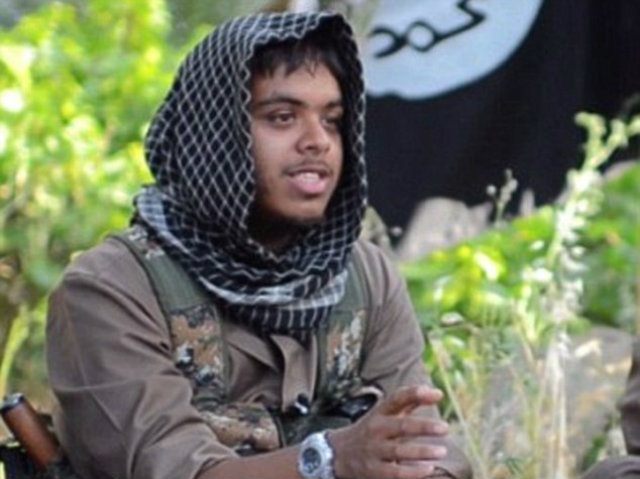Britain has killed two of its own nationals who had been fighting for Islamic State (IS) and plotting attacks on British soil, in its first air strike in Syria, Prime Minister David Cameron said on Monday.
Despite not having a parliamentary mandate to take military action in Syria, Cameron told MPs that, as an act of self-defence, Briton Reyaad Khan had been targeted and killed in a precision drone strike in the country.
Cameron said the strike was carried out by a British Royal Air Force (RAF) remotely-piloted aircraft in August and that two people travelling with the man, including another Briton, Ruhul Amin, were also killed.
“There was a terrorist directing murder on our streets and no other means to stop him,” Cameron said. “We took this action because there was no alternative.”
The air strike was “entirely lawful”, he said.
Amnesty International’s UK Director Kate Allen said it was
“extremely alarming that the UK has apparently been conducting summary executions from the air.
“In following the United States down a lawless road of remote-controlled summary killings from the sky, the RAF has crossed a line,” she added.
British warplanes have launched regular air attacks against Islamic State fighters in neighbouring Iraq in recent months and flown drones over Syria to gather military intelligence. But unlike some countries in a U.S.-led international coalition, it does not generally target IS in Syria.
The Royal United Services Institute (RUSI) think tank said the strike marked a big departure in policy.
“The point is not so much that this man was British but that he was targeted in an area that the UK does not currently regard, legally, as an operational theatre of war for UK forces,” said RUSI Director General Michael Clarke in a statement.
In 2013, Cameron suffered a humiliating defeat in parliament when he sought approval of possible military action against Syrian President Bashar al-Assad.
That defeat was inflicted by the opposition Labour Party, whose popularity among a war-weary electorate still suffers because of the decision by former leader Tony Blair to take Britain to war in Iraq in 2003.
But on Monday Labour struck a conciliatory tone and refrained from directly criticising the air strike. Interim leader Harriet Harman’s response focussed on seeking more information about the legal basis for the strike and the procedures taken to authorise it.
“There is a need for independent scrutiny of what the government has done here,” she said.
PLOTS
Khan, from the Welsh capital Cardiff, and Amin from Aberdeen in Scotland had their assets frozen by the Treasury last year after reports they had been involved in terrorism-related activities in Syria and appeared in an IS recruitment video.
“There was clear evidence of the individuals in question planning and directing armed attacks against the UK,” Cameron said. “These were part of a series of actual and foiled attempts to attack the UK and our allies.”
A third Briton fighting with IS, Junaid Hussain, was killed in a separate U.S. air strike, Cameron said. U.S. authorities last month reported on the death in Syria of Hussain, describing him as a hacker from Birmingham in England who was believed to have been one of Islamic State’s top computer experts.
Cameron said both Khan and Hussain had been involved in “plots to attack high profile public commemorations, including those taking place this summer”.
He said the drone strike was not an expansion of Britain’s role, but added that there was a strong case for one.
He said he would not join coalition strikes in Syria without first winning parliamentary approval. Harman said Labour would “carefully consider” any proposal to extend military action into Syria.
An effort by Cameron to build a cross-party consensus for a fresh vote is likely to be opposed by leftwing lawmaker Jeremy Corbyn, the favourite to become Labour’s new leader on Saturday.

COMMENTS
Please let us know if you're having issues with commenting.